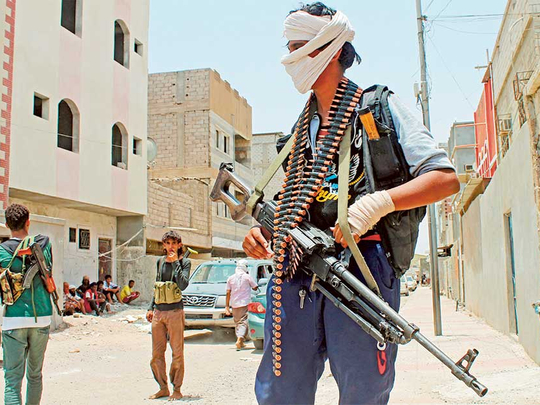
Aden: Yemen’s former president Ali Abdullah Saleh said on Friday he would not leave the country, dismissing reports in the Gulf Arab media that he was seeking a safe exit as Saudi Arabian war planes bomb troops loyal to him and their Al Houthi militia allies.
The United Nations, meanwhile, said about 150,000 people had been driven from their homes by the fighting and more than 750 people killed.
Saudi-led warplanes pounded a convoy headed to bolster an assault on loyalist forces in Yemen’s battleground second city Aden, while fighting raged in the third city of Taiz, officials said Friday.
At least 20 militiamen were killed, and two tanks and four armoured vehicles destroyed, in the overnight air strikes on the convoy headed out of Yemen’s largest airbase, Al Anad, provincial official Abd Rabbo Al Mihwali said.
The base was the main watch post for a long-running US-led war on Al Qaida in Yemen and its evacuation by Western troops as the rebels advanced last month has created a vacuum that the militiamen have exploited to make big territorial gains.
In Taiz, in the central highlands north of Aden, at least 16 people were killed as soldiers that have remained loyal to exiled President Abd Rabbo Mansour Hadi put up fierce resistance to an attack on their base by Al Houthi militiamen and renegade troops.
Many schools, hospitals and mosques had been damaged or destroyed in the conflict, it said.
The Iran-backed Al Houthis, a movement from northern Yemen, have formed an alliance of convenience with Saleh, who is widely believed to be plotting behind the scenes to make a comeback on Yemen’s tumultuous political scene.
But military sources have said some army units loyal to Saleh have defected and now support Hadi.
Saudi-owned Arabiya TV, citing a Gulf official, said representatives of Saleh had visited Arab capitals and floated an initiative for him and his family to leave safely.
Saleh scoffed at the report.
“I’m not the type who goes looking for a place to live in Jeddah, Paris or Europe. My country is my birthplace. The person who can say to Ali Abdullah Saleh ‘leave your country’ has not been and will not be born,” he wrote on his Facebook page.
Saleh, once backed by Saudi Arabia, is widely regarded as one of the Middle East’s most skilled political operators.
Despite being forced to step down in 2012 under a Gulf-brokered transition plan following protests against his 22-year rule, he won immunity in the deal and has remained a powerful political player.
UN appeal for funds
Although rooted in local rivalries, the conflict is the newest front in a sectarian proxy war between Saudi Arabia and Iran that also stretches to Iraq and Syria. Iran called this week for a ceasefire and dialogue, but the appeal fell on deaf ears.
In Geneva on Friday, the UN humanitarian agency Office for the Coordination of Humanitarian Affairs (OCHA) said about 150,000 people have been displaced — 50 per cent more than the previous UN estimate. Health facilities had reported 767 deaths from March 19 to April 13, almost certainly an underestimate, it said.
“Thousands of families have now fled their homes as a result of the fighting and air strikes,” the UN humanitarian coordinator for Yemen, Johannes Van Der Klaauw, said in a statement.
“Ordinary families are struggling to access health care, water, food and fuel — basic requirements for their survival.” The fighting had destroyed, damaged or disrupted at least five hospitals, 15 schools, Yemen’s three main airports, two bridges, two factories and four mosques, as well as markets, power stations and water and sanitation facilities, OCHA said.
Public water services were on the verge of collapse and hospitals were overwhelmed with casualties.
The United nations appealed for $274 million (Dh1 billion) to meet Yemen’s humanitarian needs over the next three months.
UN Secretary-General Ban Ki-moon called for an immediate halt to the fighting on Thursday. But his special envoy to Yemen, Jamal Bin Omar, quit after his plan to halt the war failed.
In other developments, military units protecting the Masila oilfields, Yemen’s largest, withdrew on Friday and handed over security to armed local tribes, the tribesmen and oil company employees said.
Companies that run the fields include state-owned PetroMasila, Canada’s Nexen Energy and France’s Total.
The oil industry is watching the conflict with concern as Yemen lies on shipping lanes and the narrow Bab Al Mandeb passage, through which nearly four million barrels of oil are shipped daily to international markets.
The conflict also has wider strategic dimensions. The US has poured aid and personnel into Yemen in recent years as part of its war on extremists, but its military teams evacuated last month.
Iran has called for immediate peace talks between Yemen’s warring parties, official media said on Friday, as militiamen backed by Tehran battle loyalist forces supported by Saudi-led air strikes.
Iranian Foreign Minister Mohammad Javad Zarif made the appeal during a telephone call with UN chief Ban Ki-moon on Thursday, the Islamic republic News Agency (IRNA) said.
Iran has proposed a peace plan for Yemen that calls for a ceasefire followed by foreign-mediated talks by all sides.
“Mr Zarif referred to the Iranian four-point plan to end the crisis in Yemen, stressing the importance of an immediate dialogue between the Yemenis and said Iran was ready to help resolve this crisis,” IRNA said.
“Ban Ki-moon acknowledged the efforts of the Islamic republic to peacefully resolve the crisis in Yemen and focused on the immediate provision of medicines and food to those affected,” it said.












